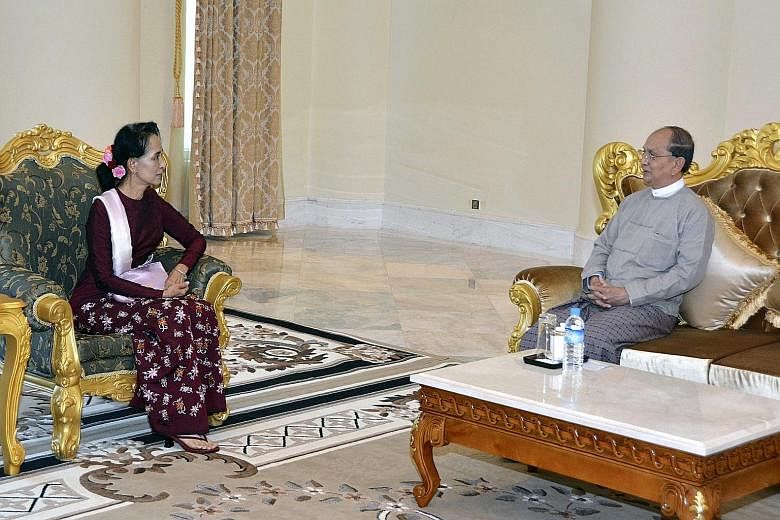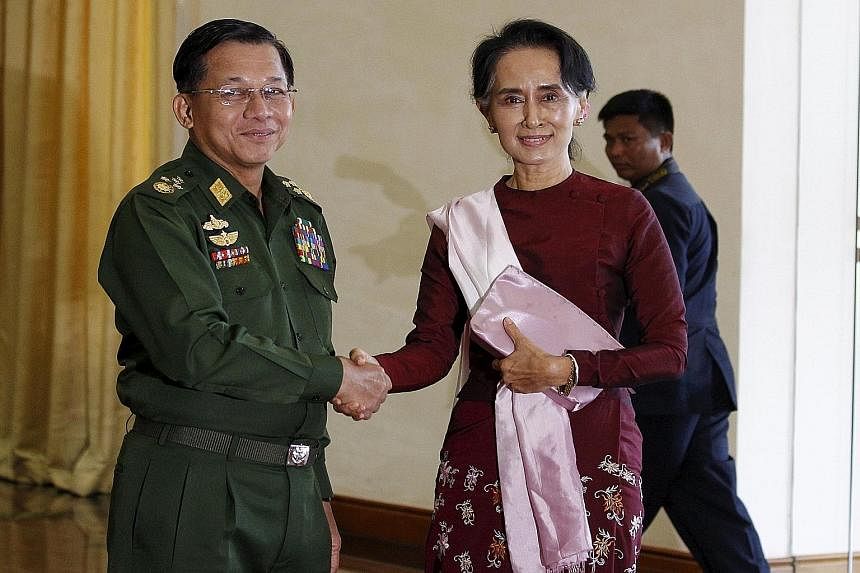In their first meeting since the Nov 8 General Election, Myanmar's President Thein Sein congratulated opposition leader Aung San Suu Kyi on her party's victory and assured her of a smooth transfer of power.
The two met yesterday for 45 minutes at the President's sprawling, high-ceilinged office in Naypyitaw in the morning.
It was a "warm" meeting, said Minister of Information Ye Htut, who was present.
"We have opened a communication channel between the two sides," he told journalists.
"The discussion was warm and open... They mainly focused on the smooth and peaceful transfer of state responsibilities to the future government."
Later in the afternoon, Ms Suu Kyi met separately, and also for the first time since the election, for one hour with the powerful commander in chief of the armed forces, Senior General Min Aung Hlaing.
They agreed "to cooperate on stability and peace, the rule of the law, unity and reconciliation and development of the country as regards to the wishes of the people", according to a statement posted on the Facebook page of the general's office.
All eyes were on the critical meetings, for signs of a smooth transition from the quasi-civilian administration stacked with retired generals - Mr Thein Sein is a former top general, and Mr Ye Htut, a former major general - to one run by Ms Suu Kyi's National League for Democracy (NLD).
The NLD won an overwhelming majority in Parliament - but Ms Suu Kyi cannot be president under the current Constitution because of her foreign family ties.
The party won nearly 80 per cent of contested seats in the Nov 8 parliamentary elections, with the army-backed Union Solidarity and Development Party (USDP) punished by voters in an emotional response to decades of army rule.
The army still controls 25 per cent of total seats however, effectively holding a veto against changing the Constitution - something high on the NLD's agenda but also a potential sensitive point for the army. The army also controls three key ministries - defence, home affairs and border affairs.
"The NLD's election victory is unlikely to affect the country's fundamental power structure with the military at its apex. All that can be done now is… see the difficulties that lie ahead," Myanmar analyst and author Bertil Lintner wrote in the journal The Irrawaddy on Tuesday.
"Any attempt to change the 2008 Constitution would put the NLD on a direct collision course with the military, for among the charter's 'Basic Principles' is a strong pledge: 'The Defence Services is mainly responsible for safeguarding the Constitution.'"
Under Myanmar's system, the new Parliament will convene only in January.
In February, sitting MPs will elect the next president, whom Ms Suu Kyi, 70, has made clear will be a person of her choice, behind whom she will wield the real power.
The transition is unprecedented for Myanmar, a country under military rule for decades until 2011 when the current USDP government emerged out of a general election boycotted by the NLD, and also widely seen to have been rigged.
Acknowledging this, Mr Ye Htut told journalists yesterday: "We have no tradition of the peaceful (power) transfer to a new elected government since we gained independence in 1948."
But he added emphatically: "We will establish this tradition without fail."



